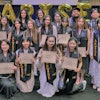Thanks to a National Park Service grant, the archives of 15 California State University campuses are collaborating to digitize about 10,000 documents and 100-plus oral histories connected to the incarceration of Japanese Americans during World War II.
A two-year, Park Service grant of $321,000 was awarded recently to Cal State Dominguez Hills, the lead institution for the CSU Japanese American Digitization Project. The Park Service grant is the federal agency’s latest effort to support historically significant Asian American and Pacific Islander events and people.
The Cal State project will make materials widely available on a university-sponsored website. It will also produce a teaching guide and a traveling exhibit tracing the shameful story of how the U.S. government forcibly imprisoned about 120,000 people based solely on their ancestry.
“This significant part of our history can be studied for generations to come,” says Greg Williams, director of archives and special collections at Dominguez Hills.
Many Cal State campuses are near Japanese American communities and the former internment camps. In recent decades, college libraries and history departments have collected first-person accounts, personal belongings, media and manuscripts related to the mass incarceration.
One of the most disgraceful chapters of U.S. history began in the aftermath of Japan’s bombing of Pearl Harbor in December 1941.
Amid the ensuing hysteria and xenophobia, President Franklin Roosevelt signed Executive Order 9066, which singled out Americans of Japanese descent. The order called for curfews and mass removal of Japanese Americans from their homes, workplaces and schools, mostly along the West Coast.














